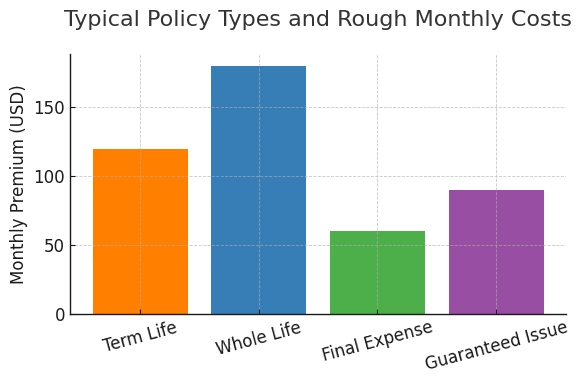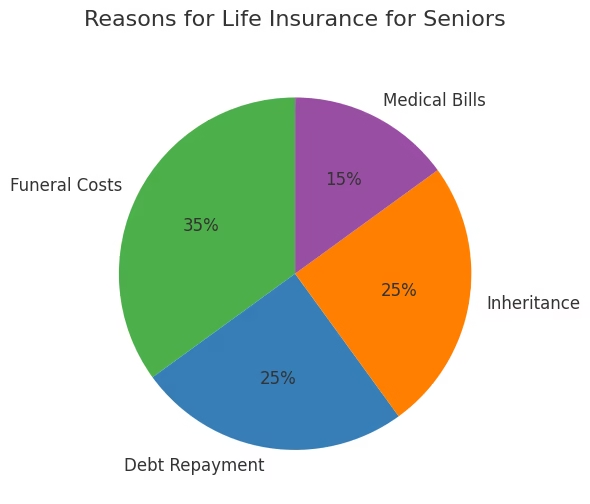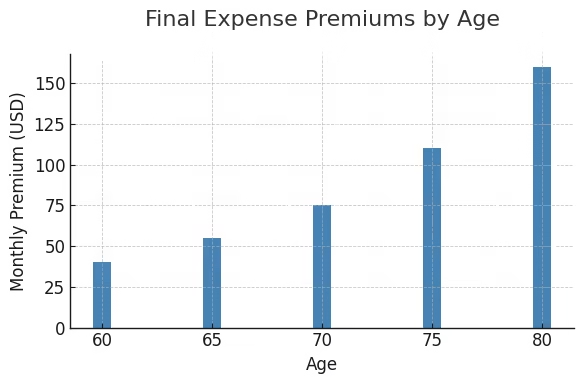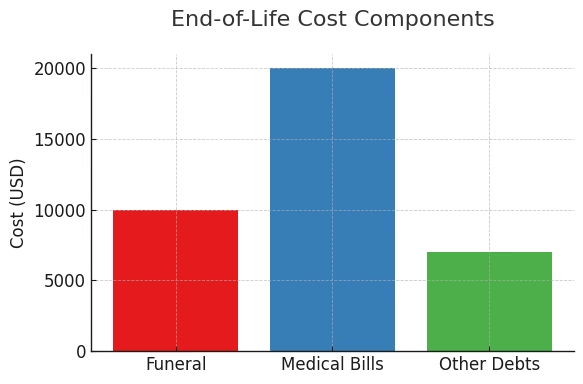
Why Seniors Need the Right Life Insurance
Best Life Insurance for Seniors in USA is not just about money. It is about peace of mind, stability, and leaving behind a legacy for your family. If you are over 60 or looking for the best life insurance for parents over 60, you already know how important it is to find affordable coverage that meets your needs without draining retirement savings.
Unlike younger buyers, seniors face unique challenges. Premiums are higher, health conditions may limit options, and policies can be complex. At the same time, the need for coverage often becomes greater. Whether it is paying off debts, covering funeral expenses, or leaving an inheritance for children, the right policy provides security.
Now, let me ask you a quick question.
What do you think is the biggest factor affecting life insurance premiums for seniors?
a) Age
b) Lifestyle habits
c) Medical history
d) All of the above
Answer:
It is d) All of the above. Age plays the biggest role, but health and lifestyle choices like smoking also affect costs significantly.
Understanding Life Insurance for Seniors
Before exploring the best life insurance for over 60s, it is important to understand the types of policies available. Seniors often have different goals than younger buyers, so the right choice depends on personal needs.
1. Term Life Insurance for Seniors
This policy provides coverage for a specific number of years, usually 10, 15, or 20. It is cheaper than permanent life insurance, but once the term ends, the coverage stops. Seniors who only need protection for a limited time, such as until a mortgage is paid off, often choose this option.
2. Whole Life Insurance for Seniors
This policy covers you for your entire life and builds cash value. It is more expensive but guarantees a payout. Many seniors prefer whole life insurance because it ensures that loved ones will receive benefits no matter when they pass away.
3. Final Expense Insurance
Also known as burial insurance, this is designed to cover funeral costs, medical bills, and small debts. Coverage amounts are lower, usually between $5,000 and $25,000, but premiums are more affordable.
4. Guaranteed Issue Life Insurance
This is ideal for seniors with health issues who may not qualify for traditional policies. There are no medical exams, but premiums are higher, and coverage is often limited during the first few years.

Why Best Life Insurance for Seniors in USA Matters in 2026
Life expectancy in the US has been rising again after recent declines. Seniors today live longer, healthier lives, which makes insurance planning even more important. Choosing the best life insurance for parents over 60 means ensuring they are not leaving behind unexpected financial stress for their children.
Consider this:
- The average funeral in the US costs between $8,000 and $12,000.
- Medical bills from late-life care can easily reach tens of thousands.
- Debt, especially mortgage or credit cards, can burden surviving family members.
When seen this way, the cost of a policy is often far less than the financial hardship it prevents.
Common Mistakes Seniors Make When Buying Insurance
- Waiting Too Long: Premiums rise every year you delay. A policy at 60 may cost half as much as the same one at 70.
- Buying More Coverage Than Needed: Seniors often do not need million-dollar policies. A modest amount can still provide strong protection.
- Ignoring Health Options: Even if you have health issues, many insurers offer tailored plans. Always compare.
- Not Comparing Companies: Rates vary widely between insurers, and the cheapest plan is not always the best.
- Forgetting Riders: Options like accelerated death benefits (which allow you to access funds if diagnosed with a terminal illness) can be a lifesaver.
Case Study: Choosing Insurance at Age 65
Imagine Mary, a 65-year-old widow living in Florida. She has no mortgage but wants to leave $20,000 to her two children to help with funeral costs and as a small inheritance.
- If Mary chooses final expense insurance, she can pay around $60 per month and guarantee coverage for her lifetime.
- If she chooses whole life insurance, the cost may be higher, but her children could inherit a larger sum.
- If she chooses term life insurance, she might save money now, but if she outlives the term, the coverage will end.
This shows why matching goals to policies is key.

Comparing Policies: Which Type Is Right for Seniors?
When exploring the Best Life Insurance for Seniors in USA, the key challenge is choosing between affordability, coverage length, and flexibility. Let’s break it down in a way that makes sense for someone over 60.
Term Life Insurance vs Whole Life Insurance
- Term Life Insurance: Lower premiums but ends after a set number of years. Seniors in their early 60s may find it useful if they only want protection until retirement debts are cleared.
- Whole Life Insurance: Higher premiums but permanent coverage. This option is popular among seniors who want guaranteed benefits for their families.
If you want to explore more, check out our guide on “Life Insurance vs Term Insurance: Smartest Way to Secure Your Future in 2026.”
Final Expense vs Guaranteed Issue Policies
- Final Expense Insurance: Tailored for those who want to cover funeral costs and small debts without burdening their children.
- Guaranteed Issue Insurance: Often a last resort for seniors with significant health issues. While premiums are higher, approval is simple, and no medical exam is required.
Quick Quiz:
If your parent is 65, has diabetes, and wants a $15,000 policy mainly for funeral costs, which policy do you think fits best?
a) Whole Life Insurance
b) Final Expense Insurance
c) Guaranteed Issue Insurance
Answer:
The best choice is b) Final Expense Insurance. It balances affordability with the purpose of covering end-of-life expenses.
Best Life Insurance for Over 60s: How Age Affects Options
For anyone asking about the best life insurance for over 60s, age matters more than anything else.
- At 60 to 65 years old: You may still qualify for affordable term policies, though premiums are higher than for younger applicants.
- At 65 to 70 years old: Whole life and final expense plans become more realistic. Term policies exist but often have shorter terms and higher costs.
- At 70+ years old: Guaranteed issue or final expense insurance is usually the most practical option.
Here’s an example:
- A 62-year-old non-smoker male may pay around $120/month for a $100,000 term policy.
- A 68-year-old with the same health profile may pay nearly $200/month or more.
- A 72-year-old might struggle to qualify for term at all and would pay $80/month for just $15,000 in final expense coverage.
Choosing the right life insurance also depends on your retirement savings. Check out our guide on how much to save for retirement in the USA to align your coverage with your financial goals.

Best Life Insurance for Parents Over 60: What Families Should Know
If you are looking for the best life insurance for parents over 60, the process is often led by adult children. You may be helping your parents compare options, review health conditions, and understand costs.
Key Factors for Families:
- Affordability: Parents may live on fixed retirement income, so premiums should not eat into daily expenses.
- Coverage Needs: Decide whether insurance is meant to cover only final expenses or to leave a legacy.
- Ease of Application: Some seniors may prefer no-medical-exam policies.
- Company Reputation: Choose insurers with strong financial ratings to ensure claims are paid.
Example Case:
David, a 35-year-old son, is researching policies for his 64-year-old father in Texas. His father is healthy but retired. David helps him choose a $25,000 whole life policy to cover funeral costs and leave a small inheritance. This costs about $90 per month, which fits his father’s retirement budget.
For more information and trusted guidance on life insurance options for seniors, you can visit AARP Life Insurance as a reliable resource.
Top Life Insurance Companies for Seniors in USA 2026
When narrowing down the Best Life Insurance for Seniors in USA, certain companies consistently stand out in 2026 due to affordability, customer service, and flexibility.
- Mutual of Omaha
Known for excellent final expense policies, simple applications, and affordable rates for seniors. - New York Life
Offers whole life and universal policies with strong financial ratings and customization options. - AIG (American International Group)
Popular for guaranteed issue life insurance with no medical exams required. - State Farm
Offers term and whole life policies, strong local agent support, and good reputation for customer service. - Transamerica
Known for competitive rates for seniors in their early 60s and flexible term coverage options. - Colonial Penn
Often chosen by seniors looking for small, affordable guaranteed issue policies.
How to Find Affordable Life Insurance as a Senior
Finding the best life insurance for over 60s or parents over 60 does not mean accepting the first quote. Here are strategies to save money:
- Compare Multiple Insurers: Premiums can vary by 30 to 40 percent for the same coverage.
- Consider a Smaller Policy: Instead of $100,000, many seniors opt for $20,000 to $50,000, which reduces costs.
- Improve Health Before Applying: Quitting smoking or managing blood pressure can lower premiums.
- Bundle with Spouse: Some insurers offer discounts if both partners apply together.
- Work With Independent Agents: They can compare across multiple companies instead of selling you just one brand.
Question:
Have you ever compared two different quotes for the same coverage and been shocked by the difference? Share your story in the comments as it will help other readers make informed decisions.

Practical Tips for Choosing the Right Life Insurance
Choosing the best life insurance for seniors in USA involves more than just picking a plan with a low premium. It requires aligning coverage with personal goals, financial situation, and family needs. Here’s how to make the right decision:
1. Define Your Goals Clearly
Ask yourself: Do you want the policy mainly to cover funeral expenses, leave a financial legacy, or pay off debts? Seniors who want to leave a modest inheritance might choose whole life insurance, while those focusing on end-of-life costs may prefer final expense policies.
2. Balance Cost with Coverage
Compare monthly premiums against the benefits offered. A plan that seems cheap upfront may provide limited coverage or increase premiums with age. Make sure the policy fits comfortably within your retirement budget.
3. Health and Lifestyle Considerations
Your current health and lifestyle significantly influence premiums. Non-smokers with controlled medical conditions generally receive better rates. Seniors with chronic illnesses might consider guaranteed issue or simplified issue policies, even if the premiums are higher.
4. Understand Policy Riders
Riders add flexibility and additional coverage. For example, an accelerated death benefit rider allows access to funds if diagnosed with a terminal illness. Accidental death riders can increase the payout for specific events. Evaluate whether riders justify the extra cost.
5. Seek Professional Guidance
Working with a licensed agent or financial advisor can save time and prevent costly mistakes. They can compare multiple insurers, explain fine print, and recommend plans suited to your age, health, and financial goals.
Frequently Asked Questions About Senior Life Insurance
Can seniors over 70 get life insurance?
Yes. Policies like guaranteed issue and final expense insurance are designed for seniors over 70. These policies usually have smaller coverage amounts but provide peace of mind without a medical exam.
Is it too late to buy life insurance after 65?
It’s never too late. While premiums increase with age, even a small policy can relieve your loved ones from unexpected costs. Early planning, even at 65 or 70, is still beneficial.
Should I choose term or whole life insurance?
It depends on your goals. Term insurance is generally cheaper but ends after a fixed period. Whole life insurance is more expensive but provides lifelong coverage and builds cash value.
How much coverage do seniors really need?
A modest amount often suffices. For many seniors, $20,000 to $50,000 covers funeral costs and small debts. Larger amounts may be appropriate if leaving a legacy or covering substantial debts.
Mistakes Seniors Should Avoid
- Delaying Purchase: Waiting can significantly increase premiums. Even one or two years can cost hundreds more annually.
- Overestimating Needs: Many seniors buy excessive coverage, straining their retirement income unnecessarily.
- Ignoring Health Options: Explore simplified or guaranteed issue policies if pre-existing conditions exist.
- Not Comparing Quotes: Rates differ greatly between insurers. A small comparison can save thousands over the life of the policy.
- Overlooking Riders: Missing useful add-ons like accelerated benefits can limit the policy’s usefulness.
Final Thoughts
Securing the best life insurance for parents over 60 is more than a financial decision. It’s a way to protect loved ones, preserve dignity, and ensure peace of mind for both seniors and their families.
The right plan depends on your unique circumstances: age, health, financial goals, and what you want your policy to achieve. Whether choosing term, whole life, final expense, or guaranteed issue insurance, understanding the differences, comparing providers, and planning ahead is the key to success.
Question:
Think about this: If you could only choose one goal for your senior life insurance covering funeral expenses, leaving an inheritance, or paying off debts which would it be? Share your thoughts in the comments. Your experience can guide others facing similar decisions.
Remember, life insurance for seniors is about peace of mind, not stress. Even a small, affordable policy can make a big difference. Take the time to research, compare, and choose a plan that aligns with your family’s needs.



